NO AFFILIATE LINKS ON THIS BLOG, NOR ON THE WHOLE SITE!
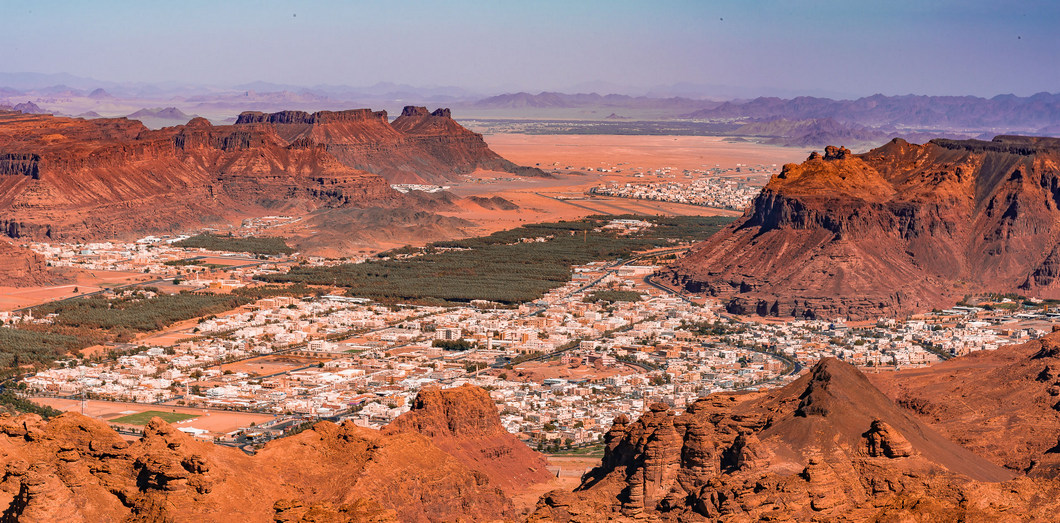
Al Ula from the Harrat Viewpoint
Initially this blog should have been an extension to our recently published TRAVELmap, but I think, it is way more than that, so from now on I just call it "blog".
Welcome to our blog about Saudi Arabia, a fascinating country with its diverse culture and captivating history! Saudi Arabia has opened its doors to tourism in 2019 and invites travelers from around the world to discover the wonders of this enchanting land. For a long time, Saudi Arabia was a destination accessible to only a few, but in recent years, the country has undergone an impressive transformation and is increasingly welcoming tourists. With breathtaking desert landscapes, impressive architectural masterpieces, historical sites, and a hospitable population, Saudi Arabia offers a rich diversity of experiences for visitors. In this blog, I'm providing you with valuable information, insider tips, and inspiring stories to give you an unforgettable glimpse into modern Saudi Arabia.
In 2022/2023, we embarked on a journey through Saudi Arabia, covering approximately 15,000 kilometers within a span of 6 months in our 4x4 Mercedes Sprinter 311. During this time, we crossed the Saudi Arabian border 8 times, beginning our main route from Oman and making our way up to Jordan, aiming to explore as much as possible. Unfortunately, during our initial attempt, the temperatures soared to an extreme level (52°C), which hindered our ability to travel according to our plans. As a result, we made the decision to prolong our stay and restart the route, albeit with some modifications this time around.
It was such a spectacular ride through a country, which has been isolated to the world for so long, that I put an extensive map together, showing the most amazing places in this huge and beautiful country.
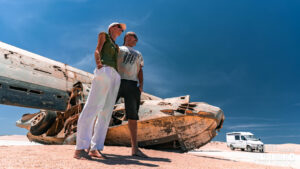
At the "Catalina Seaplane Wreck"
:: A Brief Introduction Into Saudi Arabia ::
Saudi Arabia, the Kingdom of Saudi Arabia, is the largest country in the Middle East, spanning over 2.15 million square kilometers and therefore is 2,5 times bigger than germany, for instance. With a population of approximately 34 million people, it boasts a diverse cultural and ethnic landscape, predominantly composed of Arab inhabitants. Islam is the official religion of the country, greatly influencing its culture and societal norms.
The historical significance of Saudi Arabia dates back thousands of years, with ancient civilizations such as the Nabateans and Lihyanites having flourished in the region. However, the Arabian Peninsula gained prominence in the 7th century as the birthplace of Islam, playing a pivotal role during the Islamic Golden Age.
Saudi Arabia operates as an absolute monarchy, governed by the House of Saud, with the monarch serving as the head of state. The country adheres to a conservative interpretation of Islamic law, shaping its political structure and legal system, which are founded on Sharia principles.
Renowned as one of the world's leading producers and exporters of oil, Saudi Arabia plays a critical role in the global economy. The country possesses vast oil reserves, contributing significantly to its GDP. However, recognizing the need for economic diversification, Saudi Arabia has embarked on initiatives like Vision 2030, aimed at reducing its reliance on oil and fostering growth in sectors such as tourism, entertainment, and technology.
On the international stage, Saudi Arabia holds substantial influence due to its strategic location, economic prowess, and its status as the birthplace of Islam. It actively participates in regional and global affairs, maintaining strong relationships with key stakeholders. It is a member of prominent organizations such as the Arab League, the Organization of Islamic Cooperation, and the Gulf Cooperation Council.
In recent years, Saudi Arabia has embarked on a path of social reform, introducing measures to grant more rights to women, encouraging cultural activities, and promoting tourism. These efforts are part of a broader modernization agenda aimed at improving the country's international reputation. However, Saudi Arabia continues to face scrutiny and criticism concerning issues related to human rights and freedom of expression.
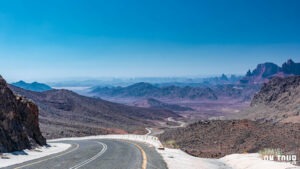
Road To Tabuk
:: People, Culture and Religion ::
Amongst others in many other countries, Saudi Arabians are some of the kindest and friendliest people, we ever met. They are interested, curious, peaceful and very, very welcoming.
They always offer their help, they like get photographed (not so much the women, but if you're lucky, even women are lifting their Hijab and Niqab for you and a photo). Males are very open and always searching for a nice talk, but women are more shy to tourists and travelers. Once you smile at them, they come towards you and "bomb" you with questions (how cute😍).
Of course they're muslims, but as most of them are from "sunni (sunna)", they won't try to "infiltrate" you. (Because it's forbidden to them to convert people and they do not have any problem with christians, nor with atheists, but the last topic is always up to your own communication skills).
Their culture is pretty much "simple" nowadays, I would say. They like smells of perfume (don't wonder, when they're spraying you), hanging out in huge shopping malls, they go for camping (but not in that way, we are used to), they love the luxury and are using Snapchat, TikTok and Instagram a lot and: they might prey up to 8 times a day (whereas 5 times is mandatory). In the summer you won't see so much while the daytime, as they affectionately call themselves "Vampires" ;).
Once the sun goes down, they're flooding the beaches, streets, cities and markets. But there's so much more to say about these "Saudis", that I would suggest you find it out by yourself 😁.
Saudi Arabian food is tasty, but very monotonous for our personal taste: Kabsa and Sayadieh:
The first one is chicken with rice, the other one fish and rice. They eat it 3 times a day, at least this is, what Saudis often told us. Of course they got a few more dishes, but that's it, basically.
The restaurants are nice so far and here you will get different dishes. All of them have been very tasty, but also very expensive. Not an option for everyday life.
If you wanna see more of the authentic life of the Saudi Arabian people, visit the gallery of our travel buddy Robert Klinger.
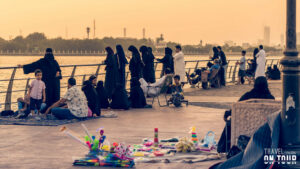
At The Corniche Of Jeddah
:: Dress Code ::
Saudi Arabia has a conservative dress code influenced by Islamic traditions and cultural norms. The dress code for both men and women in Saudi Arabia is modest and conservative.
In general one can say, that men are wearing a long white robe called a "thobe" or "dishdasha", which is often worn with a headdress called "ghutra", "keffiyeh" or "shemagh", whereas women are required to cover their bodies in loose-fitting, modest clothing. The traditional Saudi female dress is called "abaya", a black cloak that covers the entire body, sometimes accompanied by a "hijab" and/or a or face veil, called "niqab" .
Foreigners visiting or living in Saudi Arabia are expected to respect the local customs and adhere to the modest dress code.
But things changed a bit in Saudi Arabia, as Mohammed Bin Salman also changed the laws regarding the mandatory abaya for women.
Now they can choose if they wanna wear the abaya or not and you will see lots of women - especially in Jeddah - who often wearing western clothes and women who are showing a lot of skin and hair.
Nobody really cares, what foreigners are wearing. I for myself often worn shorts and Fenny prefered T-Shirts with short arms where of course a lot of skin has been visible. We never ever ran into any trouble or had conversations about our dress code, but we also saw women with hot pants or mini-skirts. We personally would avoid that though.
That said, you do not have to wear an abaya as a female foreigner, nor you really have to cover all your skin or your hair. This is western thinking and obsolete. There's also no such thing like "cultural appropriation". If you wanna wear an abaya or a dishdasha, just do so and Saudi people will really appreciate.
This all does not apply, when visiting mosques. Here's a strong dress code and you will be asked as a man to wear long wide trousers, whereas for women an abaya and hijab is mandatory.
Sometimes it might happen, that you will be invited for dinner and people are asking you - as a woman - to wear an abaya. It's up to you, if you accept or deny. We only have been asked once and we denied, because it was just way too hot.
If you respectfully tell your hosts, that it isn't part of your culture, as well as there isn't any law about it in the KSA, most people will understand and tolerate. But we just had it one time. So: nobrainer.
Just one thing for the "beach day": If you'll find a beach, you barely will see muslims swimming. We never saw them in the KSA. If you wanna swim, do so, but expect a lot of views from local men.
In a bikini or in a swimsuite you are basically nearly completely naked for them. I would advise to don't do that. We also find it extremely offensive to the Saudi Arabian women.
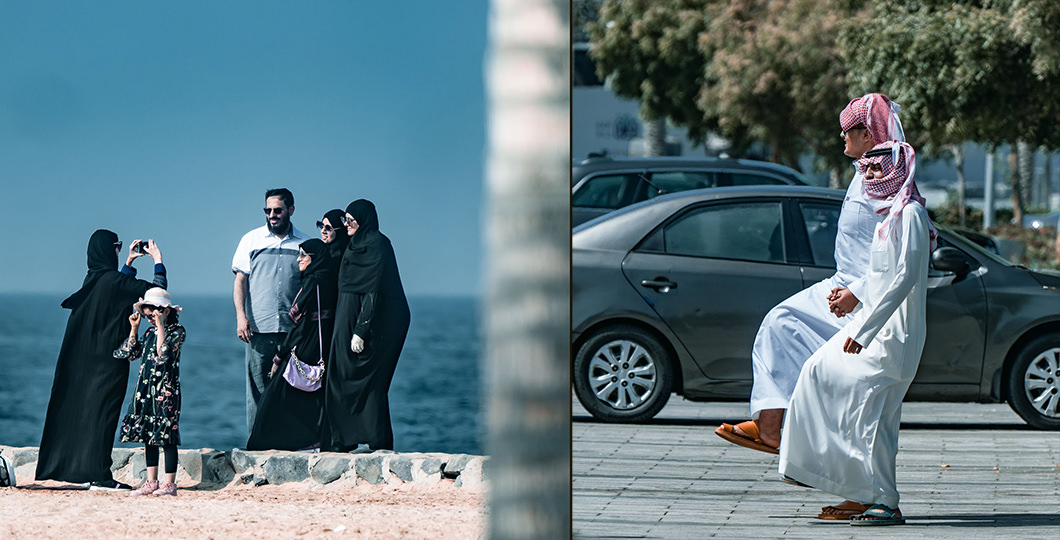
Most of the Saudis wearing traditional Thawb and Abaya
:: Currency and Money ::
They are using "Saudi Rials (SAR)". 1 Rial is 0,24€cents.
In every bigger city you'll find dozens of ATM's. Tiny buildings as a self-service machine, directly at the road side. Some ATM's are only in arabic, which makes it pretty difficult to get your coins.
We highly recommend RAJHI ATMs, when these machines are directly located at a bank, because we didn't pay any fees here and also, because the machine might suck your credit-cards.
The price ranges are a bit higher and sometimes so high, that you can't believe your eyes. We found it more expensive than in germany for instance. On the other side the Diesel price is the second lowest on the planet: r.a. 16€cents per liter. Only Iran is cheaper (yes, a 16th of one liter in the KSA... you read it right🤷♀️)
Well... sometimes you won't believe your eyes.
:: Traffic, Fuel, Workshops, Spare-Parts::
I need to say, that Saudis are - amongst maybe Indians - are the worst drivers on the planet. They just drive like crazy, insane and without any common sense... and they do not care about foreigners (they're like "Dr. Jekyll und Mister Hyde", when sitting behind a stearing wheel).
Be very, very carefull while driving in cities like Riyadh, Jeddah, Mekka, Medina, Hail and other bigger ones. No, be careful everywhere 🤷♀️.
That brings us to another very annyoing point: Speed-bumbs, humps and rattle lines. Saudi Arabia has thousands of them, spread over the whole country. Sometimes it happens, that you pass a sign which says "100 kmh" and 50m further you'll jump over one of these insane speed-bumps, which can be very tall. You might brake your car.
Spoken about the cars:
Once you enter the country, you will see thousands over thousands of kinda new cars, which are heavily broken. Saudi Arabia's traffic fatalities are the highest on planet earth. Be very careful!
I really cannot give tipps how to drive, because it just doesn't matter, if you are very slow, very fast or just doing nothing. They might get you, that's just it 🤷♀️.
I guess in the KSA are as much gas stations as in Turkey for instance and mostly you'll find Diesel everywhere, even though it can be, that you may need to wait for some hours to get some fuel (mostly in the north east). The Diesel is very cheap and quality wise OK so far.
That means it might not be Euro-Diesel (maybe Euro 1 or 2?), but we never had any problems, nor did it emit a strong odor from the exhaust (which is an indication of poor quality). However, be cautious with any Diesel Heater. This one might get clogged. Fortunately, you won't need it most of the time.
Talking about workshops, I need to say, that the standard is way beyond (!) the european one. Be prepared, very careful and never let your car alone.
Mechanics won't understand the purpose of our car. They'll just fix it for the next few hundreds of kilometers until it will break again. I could write books about it. Just sayin' 😉
Driven cars in Saudi Arabia are Toyota, Nissan, Kia, Hyundai and some chinese brands. If you drive anything else: bring-your-spare-parts! If they need to order, it costs a kidney and takes months probably (we paid a lot and waited 2 months for ours).
They always will tell you, that they will find any spare-part here, but they definitely won't. Don't waste your time here🤷♀️.
If you drive a Sprinter for instance, I need to say, they do not have even one single piece for that car, but if you drive a Hilux, it'll be heaven on earth for you. At Mercedes we should have waited 6 weeks for the parts to arrive. Do not even count on your luck, just saying 😉
Here you can read our (german) Facebook-article about our experiences, as well as a list of spare-parts, which you could/should bring, when traveling through the arabian peninsula.
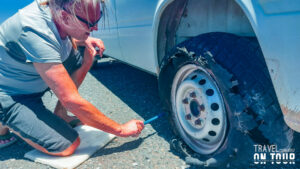
Tyre blow up in Tabuk. Without spare we would have been f**ked 😉
:: International Shipping TIP::
If you need to ship your parts or anything else from another country to Saudi Arabia, I highly recommend avoiding Saudi Post. Despite being the national postal service of Saudi Arabia, it simply doesn't work well. Their service is not just chaotic, but also unreliable. There have been several instances where we really had big problems receiving our packages.
There are multiple options available, but DHL Express stands out as the best among them. Yes, it is more expensive, and we have tried all three of their services (standard, priority, and express). With DHL Express, you can be confident that your package will arrive in Saudi Arabia after 5-7 days. However, the same cannot be said for DHL's standard and premium/priority services, as they work in conjunction with Saudi Post (it costed us 21 and 27 days and the items always have been stuck at the customs). DHL Express directly ships to a connected DHL Express Service Station or Hub, and the shipment tracking works flawlessly until the end.
Fortunately, there is a reliable service available in Saudi Arabia called "Collect and Ship." It is a package forwarding service, and we have used it several times without any issues.
Here's how it works:
Create a free account with Collect and Ship.
You will receive a virtual address, which serves as the packing center of Collect and Ship. Additionally, you will receive an ID that must always be included in your address when ordering parts.
Once you place an order, Collect and Ship will receive the package. After a few days, you will find it in your account. They will take photos of the parts you ordered, and if you have multiple packages, they will repack them free of charge. Once your orders are consolidated and complete, you provide your physical address, and Collect and Ship will deliver your package anywhere in the country. This means you don't have to wait for an extended period. You also can submit GPS-coordinates to a parking lot or a park or whatever, but we always chose a DHL Hub.
You will make the payment after that, which is very affordable compared to German prices.
Here's an example:
We ordered spare parts from Germany, Aliexpress, and Amazon. All these items were sent to Collect and Ship. They repackaged everything, took photographs, and sent it to the nearest DHL station in Tabuk (we were in Jeddah at that time). A few days after our arrival in Tabuk, the package arrived without any hassle at the DHL Hub.
With Collect and Ship, you can ensure a reliable and hassle-free package forwarding experience in Saudi Arabia.
Just to clarify, we recommend the service mentioned above, but we are not affiliated with them in any way. We have provided this recommendation based on our own positive experiences and do not receive any payment for making this recommendation.
Website Interface of Collect And Ship
:: Security, Military and Police ::
First of all, they got lots of it - Security and Police.
Saudi Arabia is the best example for nearly 100% Security. The only issues they have, are some prostitution and drug-things, but overall a policeman has "nothing big to do" (we spoke to a lot of them). The police and military is all around, not as much as in Iraq, but you'll notice them everywhere.
They are very kind and friendly and the police isn't allowed to seize tourists or travelers (as they're "sent by Allah", something like that).
Of course this only applies, as long as you're not doing something really bad.
They offer their help all the way, but might ask you also for your passports. Some travelers reported us, that they were followed by the undercover police for a couple of days. We found that very strange, as we never ever had any issue with them. We like them, nothing else.
Just to mention it in two sentences:
There's no such thing as "morality police" anymore. At least not in the former constellation and their job is anything else. So do not be worried!!!
The KSA is so safe, that we always - also in the night - have been sleeping with wide opened slide doors and windows of our Sprinter. Even though there were lots of laptops, photographic equipment and all the other stuff with lots of value laying around. They rather would prefer to chop their hands, instead of robbing you.
On the one hand they just don't need our stuff and on the other, they got quite archaic laws, especially when it's about travelers and/or stealing.
You can feel 100% safe... and... we're still alive 😉
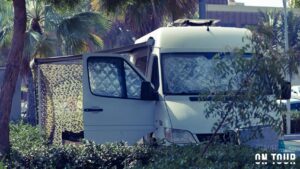
Full camping at the Corniche of Jeddah. Nobrainer!
:: Visa, Border Crossing - Car and Passenger Registration ::
In short #1: nobrainer.
In short #2: NO Carnet De Passage (and if you have one: DO NOT USE IT PLEASE and care about other overlanders, who haven't one)
The Visa you will get easily here: VisitSaudi
Costs: 500 Rial (incl. health insurance), approx. 122€ per person.
With a tourist (multi entry) Visa you are eligible to stay in the KSA for 90 days within 180 days.
In this time you can cross the border as often as you like. The Visa is NOT extendable tough!
The Saudi Arabian borders are one of the easiest and friendliest, we've been passing up to now.
Car Customs -> Passenger Registration -> Insurance -> Finished.
We crossed all the borders in the KSA from Kuwait, Jordan, Emirates, Bahrain and Oman 8 times and we never had any issue, nor it took a long time. Mostly our crossing took between 45-50 minutes.
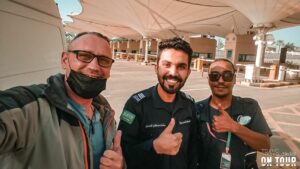
Saudi border officers are just amazing.
:: Mobile Providers, WiFi, Internet ::
Zain, STC and Mobily are the main providers for SIM-cards and it mostly takes ages to finally get the contract.
STC works very well and has the best price-performance ratio. It's expensive to get a good amount of data, but all of these solutions are working more or less good, even in the deserts. We didn't have any bigger problems.
WiFi / WLan isn't really present like in other countries, but of course cafes and restaurants will provide you with that. Here and there, they got these WifI-Pillars at the beach, but they barely work and maybe you don't wanna spend your precious time at the beaches all the time.
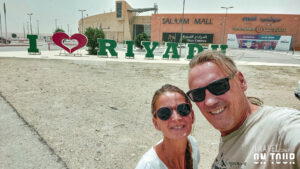
In Riyadh. We didn't find any free WiFi here.
:: Water And Gas Situation ::
Finding water is a nobrainer in the KSA.
We mostly got it from mosques or gas stations. Nobody will charge you for that, but if there are any persons, just ask proforma (nobody will deny). When driving in more remote areas you might see big white water-tanks in the middle of nowhere. At first we were in doubt, but their water is chrystal clear, tastes very well and at a certain point we thought, that it might be for people, who are coming along the road, as animals are using different water sources.
Mostly you'll find a tap or a hose and we would say that you can drink the water without hesitation.
(Nevertheless a filter might be a good idea anyway)
If you're uncertain about this type of water, of couse you can buy it anywhere, but we think, it's not necessary, as we never had any issues (I am a bit more sensitive to food and water).
Cooking Gas is a different story though, as they have their own filling system.
That said, you won't find any station, that can fill up your gas bottles from outer country.
In Bahrain we bought a common 3 KG gas cylinder (approx. 35€), which can be filled anywhere on the arabian peninsula for just a few bucks (between 1,80€ - 3€).
The separate bottle also had one big advantage. We used it outside of the van, mainly in the front of the Sprinter. Imagine cooking inside the housing, when it has 50°C outside. The inside would have gotten even hotter.
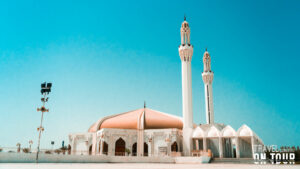
If the mosques aren't closed, you'll find water here.
:: Saudi Arabian Attractions ::
In short: You might get disappointed here and there.
Some attractions are simply closed, due to renovation for the upcoming tourism and it could be, that you've driven hundreds of kilometers, just for standing in front of a closed entry🤷♀️.
Other attractions are only attractions for Saudis. Their way of life and entertaining is quite different. They might love hanging around in "family parks" and "entertainment parks". They got lots of it.
It's up to you. We didn't visit even one.
On the other hand, they got lovely mosques, monuments and historical sites, which are worth a visit. Just check the map.
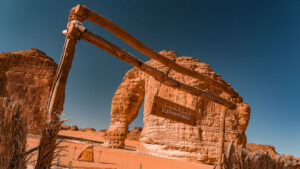
The "Elephant Rock" in Al Ula, north of Saudi Arabia.
:: Saudi Arabian Landscapes ::
It depends on your favours, but we loved them all. From the Rub al Khali over Najran, by Al Abha up to the north of Tabuk and Al Ula. Breathtaking. There is so much more to see in Saudi Arabia and this map is just a fraction (even though it contains the most stunning points) and you could spend years in this country.
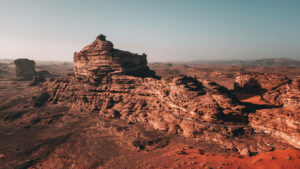
At the Alshiq Canyon - Epic surroundings here.
:: Wild Camping Freedom ::
In the KSA you can park and stay nearly everywhere. Nobody cares... really.
If you wanna camp in the middle of Jeddah - just do so. You prefer the desert - got for it.
It is common for Arabs to be present almost everywhere in Saudi Arabia. It is their land and they utilize it for their comfort. Even if you might think, that it's not a good idea to camp here and there: as long as there is no fence, just do whatever you wanna do.
Unfortunately, the freedom I mentioned earlier does not apply to the beaches.
Staying there can result in a fine, as camping is not allowed on any (!) beach. The required distance for campers is 500 meters, or you can choose to stay at some of the beach parks (which is possible, of course), but you will likely find that it's not to your liking. We drove along most of the coastlines and were always asked to leave 🙁
The police and military might say: "It's for your safety", but we do not know the real reason.
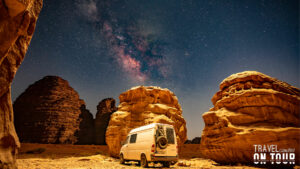
In the Hisma Desert - That Feeling 😲
:: Do you need a 4x4? ::
Short answer: No!
I'd say, that you can conquer any country with just any car, no matter what size, what power, what drive-train, but a 4x4 will help in certain or uncertain situations and that's the reason, why we always would choose a 4x4. Additionally it brings you to places, where even locals cannot go with their Sedan.
You might be stunned, when you'd see, with what kind of cars the locals are trying to reach their targets, but at the same time, they always have failures, they always get stuck and they always are in more or less trouble. But: they are chilled about that 😉
Especially in the deserts, a 4x4 is essential and you will get stuck with a 4x2 in no time, no matter what. It's just a question of time and you find yourself in a situation, where you'll need to dig out your car. And then imagine, it's 50°C outside.
So having a 4x4 will safe you from stress, from time and it will save your money, but as I said:
As long as you're not traveling too much off the road, a standard car will also do a great job and you might see lots of interesting attractions.
:: Tips for Desert rides? ::
Sure. You do not need a super fancy Offroad-Vehicle, but if you keep these steps in mind, it'll give you a good time in the deserts.
Most crucial - and for us it's the "swiss-knife" is: deflating the tyres.
Depending on your car, you might deflate down to 0,8 to 0.5bars, which sounds a lot and some drivers might think, that the tyre will come off the rim and yes... that can happen, but you can avoid it, by carefully driving.
Let's explain our strategy:
Our Sprinter is a manual 4x4 with diff-locks and it weighs approx. 3.5T.
When we drive into the desert, we don't use the 4x4 initially. At a certain point we get stuck, obviously.
Then I turn on the 4x4 and we can drive further, but we get stuck again. Then we deflate our tyres down to 1,5 bar (3,8 bar is our generic pressure). Deflating helps a lot and we do not need the diff-locks (I always try to do not use them). If we get stuck again, I deflate further down to 1 bar, then to 0,8 bar, which is the lowest at this stage. With these settings we are able to drive most of the deserts, up to a certain extent. When it is getting too steep, we must give up. Even a diff lock wouldn't help (but later I'll come back to this one).
If we get stuck with 4x4 and 0.8bar, I'll use the diff locks. This will help in 60% of the cases.
If it doesn't help, I'll need to drive backwards, searching for another route. If it works, it works, if not, then I'll search for another trail. After 3 tries we always give up and drive back.
Power
What we do not like, is the less power of our Sprinter. 109 HP, 220nm isn't much.
But it's a big advantage in the desert, because: we can not dig ourselves in. It's impossible.
When the Sprinter gets stuck, the engine shuts down more or less immediately. If I start it again, it doesn't provide enough power to spin the wheels, which prevents the Sprinter from digging itself into the sand and this is super great.
So once the car is really stuck, the only way is the way back - and this works in 95% of all cases. If it doesn't work, I'll deflate the tyres down to 0,5%. And this - in combination with some digging - is the last stage as sandboards aren't any solution for us (even though we have them). I'll take my spade, dig a little bit and I'm done, but taking off the sandboards is way too much work and in some cases I'm really too lazy. I do not need to get into any desert, just for the sake of being able to say, that I was there🤷♀️.
Be carefull!
I advise to not take the Arabian deserts lightly. Of course it seems to be a playground for desert-and offroad enthusiats, but lots of people also died there. Many arabs warned us to never ever go alone and that the desert might come with lots of quicksands, especially the Rub Al Khali (which is the largest contiguous sand desert in the world).
Always take enough water and food and beware of scorpions and snakes. A UV-light helps to see the scorpions at night. If you wanna go alone - and I repeat myself, to don't do it - give your last coordinates to friends and tell them, in which perimeter or circumference you plan to travel.
Dune-Bashing
I know it makes a lot of fun, but it also can crash your car. Try to read the sand and try to read the shape and expansion of the dunes. Some sands are really soft and even with the strongest 4x4 you'll be lost, some of these sands are harder and probably could be driven with a standard car. But the devil is always in the details, so the sand can have a strong surface which holds you, but once you reach it with your car, you immediately stuck.
We didn't do any dune bashing with our Sprinter, but we did it a lot in Morocco with our Jeep Wrangler. It makes fun but must be mastered!
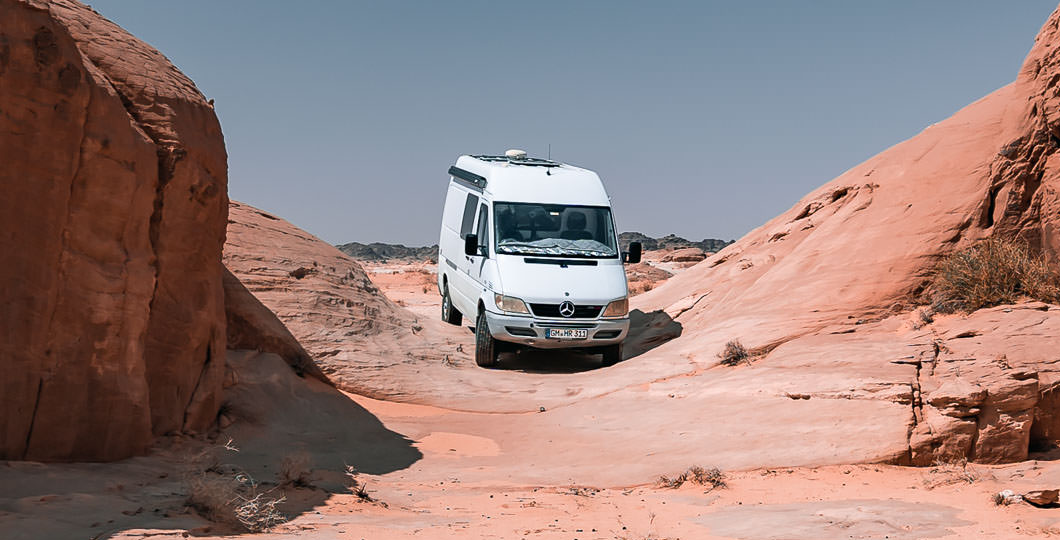
Slightly rock climbing with our Sprinter in the Tabuk region.
:: Drone Flying ::
Well, this is a topic that is often discussed and I must admit that many places are best appreciated for their holy beauty when seen from above. That's why I always find it worth taking the risk of using a drone.
In general I can say, that it is not always forbidden to fly in the most of the countries, but of course you'll need to do some research for every single one.
For Saudi Arabia I wanted to register the drone officially (DJI Mavic 2 Pro). I found a website and wrote them an email. I never got any response, as I barely got any email-response from any Arab. They do not seem to like email, even though I wrote them in arabic. (ChatGPT did a great job on that 😉 )
If you cannot register your drone, you are not allowed to fly. That's just it🤷♀️.
But as I have been flying in more than 50 countries - even without a registration - I'll go on with that. If you'll be aware of where you are flying, I wouldn't make a mind, because nobody would say anything, when you're using your bird in the middle of the Rub al Khali, where there's just nothing.
As long as you do not photograph or film any official building and as long as you're not flying inside cities, you'll be fine, I would say. That means on the other side, that your lovely movies never will contain any kind of public life on the beaches, in the cities or at any viewpoints, when there are lots of people. I do not care, I just don't wanna run into trouble and in this case, I only fly, when there are no or very less people around and I never fly inside a city or a village. I always try to keep a distance of a few kilometers and rather prefer to zoom in later on, if I'm too far away from what I wanted to film.
:: Drone importing, when coming by land borders ::
Since 13 years I'm using drones now and the biggest one has been a DJI Phantom.
I took it in my flight baggage or I brought it through the borders and I never ever had any single issue.
I do NOT lie, when they ask me for a drone, nor I hide it obviously, but I found my communication-ways to distract them from asking further and I got my places to store it, so that nobody ever could say, that I "smuggle" or hide it on purpose.
That said, it is just up to you, your self-consciousness and your communication skills, how you deal with that topic. If you are uncertain, just leave it at home, because you need to know, that if they catch you in a very bad moment, you might get arrested and the drone might get confiscated. Like in Iran, you also might get arrested for a couple of years!
We had it in Jordan and Armenia, that I got caught and in Jordan, they wanted to arrest me and wanted to confiscate our drone. Most important is here: stay calm, never ever get aggressive, be very friendly and try to catch them by emotions.
Do not exaggerate, but explain them in a very pragmatic way, what your purpose is, that you want to support their country, show them your movies, offer them a coffee and have a nice chat. For us it worked all the time. Alhamdulillah
What worked for us, doesn't need to work for others!
Always import and use your drone at YOUR VERY OWN RISK!
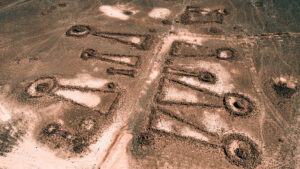
"The Gaveyard Avenue". NOT seen from below :/
:: LGBTIQ+ ::
I never would have imagined, that I would talk about it, because I just do not care, what people are doing, how they are living and what they are. People are people. Everything's fine here.
Not so in other countries but: do NOT despair!
It is nor a secret, neither a mystery, that this topic is a tabu in a lot of our 192 countries. Live with that!
But there's always a "but": Never, ever be so stupid to believe in western media. Do NOT do that!
People won't be killed in Saudi Arabia (Sharia-blabla) just for being gay, trans or whatever.
We met (forgive me the term) an "obviously-super-gay-couple" in Ryiadh (more conservative) and I was shocked, that their appearance have been that - let's call it - straight to the point.
One of them made me an offer:
"I really would like to marry you" (and hugged me in the middle of the city-center).
I asked them: "You guys are cute, but it seems, that you are gay, r8?"
"Yes... is it visible?", they smiled.
"And you don't get in any trouble?"
"No, as long as we're not kissing in public, everything is fine."
"OK, you really never had any issues?"
"No, why we should? Homosexuality is spread all over the world. People here are not talking about it, but it's existent. That's just it."
Look, how easy it can be! Be what you are, but of course, be with a bit of caution.
That means: Do NOT be woke. At first: it's not your right, to teach people and at a certain point, you might run in bigger trouble. Secondly: They never will understand!
But when I talk about "teaching", it doesn't necessarily mean, that you shouldn't try to make them understand. Sometimes it works, as I tried it a few times!
They do not care about any so called "wokeness" and they do not wait for their enlightment given by you, but they might tolerate and might show respect - also here: it's just up to your communication-skill.
Do not speak about politics if you don't know how and don't get aggressive, when they're digging bad ol' Adolf, do not try to convince them of any ways of living and mind-sets of western people. In this case, they are NOT interested at all. Keep in mind, that Saudi Arabia runs through a big transformation, as Mohammad Bin Salman (crown prince and absolute ruler of the KSA) changed a lot (to what we call "to the better").
They at first need to get used to their new rules, apart from the fact, that Saudi Arabia was nearly completely isolated from the rest of the world until 2019. Just give them time. Rome also wasn't built in 3 days!
It's on a very good way - thanks to MBS - but it is still a very conservative country.
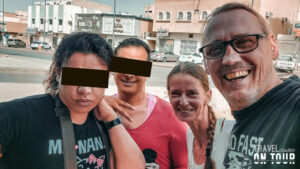
A very friendly gay-couple in Riyadh. We were stunned!
:: Saudi Arabia In The Summer - Not A Good Idea ::
You might think, that 32°C are hot. And you are right. I never could have imagined staying in a country like Saudi Arabia, where temperatures easily exceeding 40°C in no time.
But this is what happend and this is what happens every single summer.
Due to our Visa-Schedules we hadn't any other chance to try to get used to it or to leave the country immediately. We decided to stay... and we made it.
Our hottest temperature has been 52°C so far and we stood for 6 months in this unbelievable heat, in conjunction with many sand storms. When I say storms, I mean storms, because the KSA has lots of "Sandstorm Areas".
Fortunately, nothing bad happened to us or our car. However, our friends sent us pictures from within a storm, and this beast shattered two windows of their Landy. They just broke, apart from the fact, that it destroyed the brand new varnish of the car.
Not even we had to suffer. A friend called us from Ryiadh and told us, that his iPhone cable just melted. A few days later, nearly every single battery from our cameras, drones and powerbanks started to blow up.
10 batteries got completely unusable. 3 batteries from the DJI drone, 3 smartphone and one tablet battery, 2 new goPro batteries, as well as a huge powerbank (for starting the car) just gave up.
On top of that our charging booster melted as well. It just melted without melting the fuse itself.
That was a desaster and I didn't count the dozens of plastic gadgets, which melted or broke. My NIKE Sunglasses (with visual acuity), dozens of knobs, hinges, handles etcpp.
After a couple of weeks, my skin started to change. It more and more felt like an orange and I felt sick more often. I was sweating 24 hours a day and I spent more time on cooling myself down, than enjoying the country.
But hey... we found ways to deal with that. Batteries and smartphones have been placed in the fridge, we bought additional fans and we used the evaporative cooling effect, by wetting towels completely and using them as a shield for preventing overheating ourselves. It worked and we got adapted the sooner or later.
Tip: What definitely does not work, is just hanging a wet towel anywhere. You always will need an airflow, generated by wind or by a fan. If you're using a wet towel for your body, you immediately feel, how cold it gets and in many situations I needed to take the towel away, because it was getting too cold. No joke!
That said, nothing is impossible, it's just the will, but nevertheless we highly recommend not to come to Saudi Arabia in the summer. We would say that November to March is a quite nice time to fully enjoy the country. Everything else borders on masochism, naivety... or: lack of time.
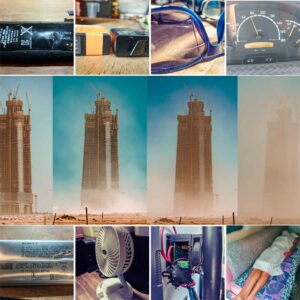
It happens, the sooner or later 🤷♀️
:: Things to take into consideration ::
Of course not everything in the KSA is shining bright and Saudis won't like, when I'm talking about it.
Saudi Arabia has unbelievable amounts of trash. "Every-single-fucking-where"😭.
You might get shocked, others might leave the country immediately. We can't find words for their behaviour, when it's up to clean up their camps or picknick-sites. They just throw their trash everywhere.
Please: DO NOT judge it. Just be the audience, but do NOT tell them to take their trash. That is presumptuous and arrogant.
After such a long time in this country, we got used to all this tons over tons of trash. At a certain point we even didn't see it anymore. This belongs to all the arabian countries and there's no exception. After having vistited 74 countries, this one is the second most trashed country so far.
Where there is a lot of trash, there may be a strong odor, but there are certainly a lot of mosquitoes and horseflies. I'm not sure if "horseflies" is the right translation, but in Germany, they are called "Wadenbeißer," and these insects are extremely annoying.
While Ramadan and/or Hajj (Haddsch) and in the very, very hot summer, lots of localities are closed and might only open at night (I bought my new laptop at 2am at X-Cite). In this case you'll need to prepare yourself and you may find it annyoing to buy stuff, because either the shop is closed until the night or they close it for praying or it is closed because it's too hot or it's closed because they just don't wanna open it🤷♀️.
They barely have forests or greenery and you might miss green gras... because here it's often artificial one. They do not have any bigger trees - or lets say "less", nor you really find any shadow, when it starts to burn. It's a desert country, and that's what you have to be prepared for. But that's also why you choose to come to a country like this, right?
When it starts to get really hot, you might search for shadow, but maybe you won't find any.
Either you start to visit the malls, but then you'll need winter clothes, because temps are going down to 16°C, or you're equipped with an air-condition or - like we - you decide to survive. We never went into hotels or any other accomodation, as it is against our philosophy. OK, we have an air-condition, but not in our living space, rather than in front of the car.
Political Situation
Even though I don't wanna talk too much about it, you need to know, where you are.
Saudi Arabia is ruled by an "absolute ruler". We might call it "Dictactorship".
The rules and laws are strong and talking bad about the Kings-Family might bring you in lots of trouble and I highly guess, your phone will be spied (you always will get messages by the former "morality police", asking you to bring any kind of "bad words against the Kings-Family" to attention).
We never made any bad experience and Saudi Arabia seems to be very stable, but of course they still suffer from terroristic attacks. That said, stay away from any demonstration or bulks of shouting and complaining people. You never know, what can happen.
Many people are still very conservative. They won't tell you, but you'll get it the sooner or later, once you're talking to them. In this case, be a bit more carefull.
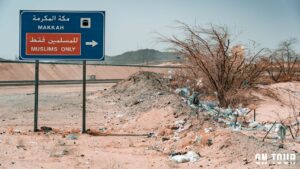
Well... double meaning?
:: Do's and Don'ts ::
I won't enumerate every single "do that" or "don't do that", as I highly count on "common sense", but here are some things you'll need to keep in mind.
The "Do's"
. Camp wherever you want, but not on the beaches (it might work, but mostly not).
. Wear whatever you want, as long as it's not too "eye catching".
. Don't be shy, wear their dresses, if you like. They love it.
. Take the things, Saudis might give you. They appreciate it.
. Take invitations of course, but listen, how often they ask.
. Make political conversations, why not, but keep in mind: You are being listened to 😉
. If the police might be too "enthusiastic": Show them their limits, but be careful.
. Of course you can deny to do "this" or "that": Tell them, that it's not your culture.
. You can visit Medina. It's allowed now, but keep in mind: they are very conservative.
. Learn just some arabic words. They love it and you'll get new friends immediately.
. Of course ask them to take off their shoes, when coming inside your mobile home.
. Be somewhat cautious when coming from the LGBTIQ community, but do not hesitate to come here.
. As a woman: If men are getting "too close", show and tell them their limits immediately!
. Live your life and live your dream.
The "Don'ts"
. Avoid camping on beaches and keep a distance of 500m to the coast.
. As a couple do not kiss or hug in public. Keeping hands could work, I dunno.
. Do not give hands to women, nor touch them. They'll come to you, if they want.
. Do not wear super tight "disco"- dresses.
. Don't go for a swim in a bikini or a swimsuite.
. Never ever go to Mekkah, do not even try. A friend got arrested for one day.
. Never ever be rude, disrespecteful or offending.
. Never ever talk bad about the islam, muslims and the government.
. Never ever insist on rights you might do not have ("it's my place, I was here before").
. Do not even try to be too woke and don't tell them to take their trash for instance.
. Do not take their trash instead. Leave it where it is. It's a lot wasted energy.
. Better do not try to teach them. Their history is rich and they survived without western ideologies.
. Do not smoke or eat in front of locals, while Ramadan.
. Do not try to invite them for dinner: they never will accept 😉

Image created by BingAI
:: Last and least ::
There are three ways to travel in Saudi Arabia.
· The "touristic" way: Chilling at the beaches, sleeping in hotels, doing some sight-seeings and having a good time.
· The "travelers" way: Listening, learning, experiencing and conquering the country as much as possible.
· The "empathic" way: Feel, what they feel, try to be them, try to understand their way of living and be as tolerant and empathic as possible and do not judge.
You might not understand everything and nobody will judge you for that. But showing empathy will bring you much more forward and at a certain point, you might even understand the "Philosophy of the Sharia" (which is NOT as bad, as it seems).
To us they said: "Saudi Arabia is your country" or "You are real Kuwaitis" (getting goose-bumps, while remembering).
Do yourself and your mindset a big favour, take all the knowledge (or the most) you got from western media and just put it here: To Trash!
It's not only the landscapes and nature, what makes Saudi Arabia so special and sometimes you'll get disappointed, but there's so much more which doesn't meet the eye and that will enlighten you to an extent you never would have believed.
This is, what we did. Never ever we have been in so much contact to locals. We met thousands of people and spoke to hundreds of them. We spoke about the "Holy Quran", the muslim way of thinking, their traditions, about politics and about what is good and what is bad. We learned so much from them and I hope, they learned from us as well.
Saudi Arabia is different, it's special, it's interesting and mind blowing and at a certain point you'll forget, what makes this country also so "bad".
All that being said, this article is 100% based on our own personal experiences. We did not rely on media sources to gather this information, although there may be some links provided that can further support our claims. If that is the case, we can confirm their validity.
Totti (from TRAVELcandies-On-Tour)
:: Finally here's our Saudi Arabia Map::
(click upper right corner to expand and jump to Google)
· Free to use, share and embed
· Approx. 500 POis altogether
· 250 Attractions (most with images and description)
· Overnight Places
· Logistic POI's like gas stations, water sources, etc.
· Our driven route (~ 15.000 km)
· Route recommendation (7500 km)
· Different categories and recognizable icons
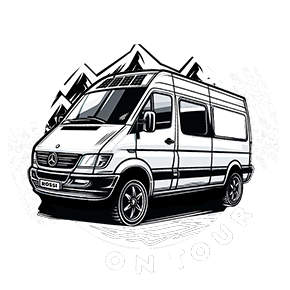

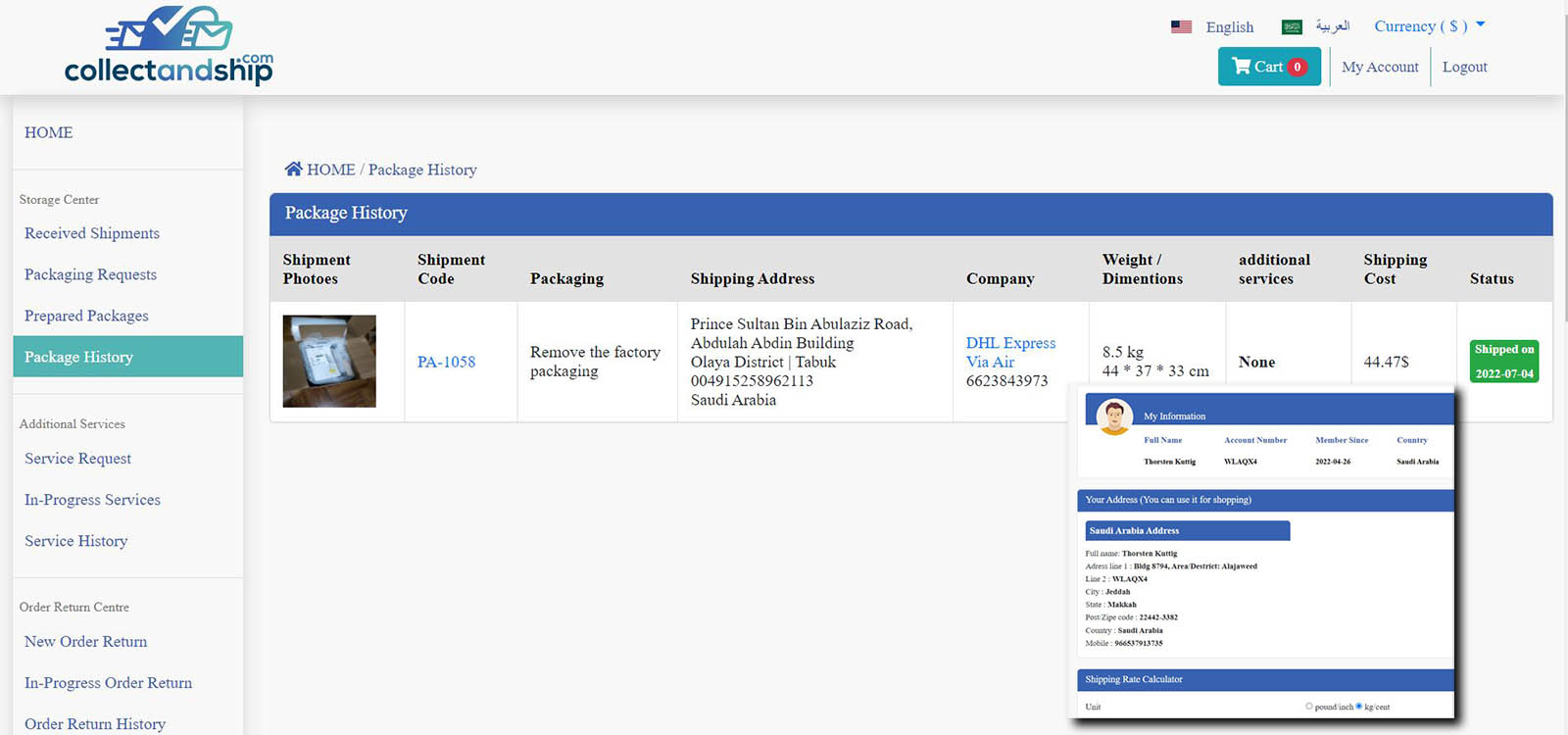

Gratulation zu dieser tollen Webseite! …und vielen Dank für die grossartigen Karten mit den POI! Wir werden sehr gerne darauf zurückreifen. Ebenfalls mit Sprinter 4×4 unterwegs, planen wir ein lange Reise in diese Region ab 2024. Im letzten Jahr haben wir ein Jahr im südlichen Afrika verbracht, mussten aber wegen einer Rücken OP wieder zurück verschiffen. Aber die Ostküste wäre wegen dem Sudan eh keine Option gewesen. Also starten wir das ganze von Nord nach Süd. Bleibt gesund und reiselustig, und vielleicht kreuzen sich mal unsere Wege. Never know. Gruss aus der Schweiz Jeannette & Martin
http://www.timbila.ch
Hey, Jeannette.
Vielen Dank, freut uns sehr, aber das mit der Rücken OP klang jetzt gar nicht gut. Alles soweit wieder in Ordnung?
Tja, manchmal kommt es eben anders. Unsere Reise war auch schon “30x” anders geplant 😉
Aber logisch: die Welt ist klein und in der Tat: you never know… wäre nicht das erste Mal.
Haltet euch wacker und viel Spaß weiterhin… bis 2024 😉
Gruß, Totti
I went to Saudi Arabia recently for umrah pilgrimage. It was an awesome experience, the food is great and the sense of security you feel is just outworldly. Due to short time, my trip was limited to jeddah, makkah and medina only but i am planning on exploring other parts of saudi arabia as well in next trip. Thank you for this great article!
Best wishes for your adventures. Would love to hear from you on whatsapp
Asad
Hey Asad, thank you very much, yeah, even though we weren’t on pilgrimage, we felt the same and we just love this country. Safe further travels to you and always great adventures and experiences 🙂
see you on the road, somewhere, somehow, sometime.
Totti